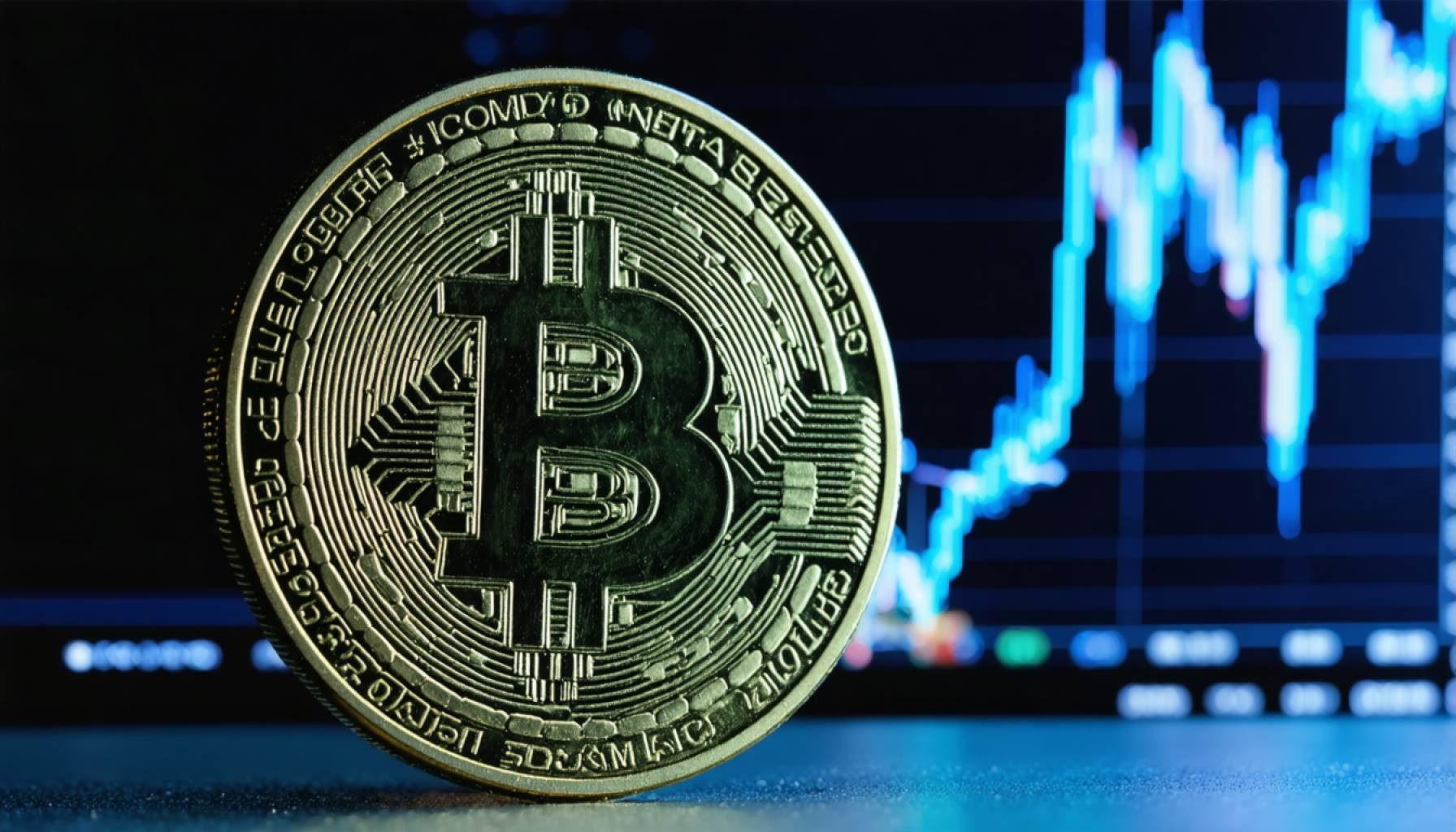- Bitcoin’s price cycles are driven by the four-year halving events, reducing new supply and often triggering major rallies.
- The 2024 halving intensifies scarcity, with only 21 million Bitcoin ever to exist, strengthening its value narrative.
- Analysts increasingly compare Bitcoin to gold, highlighting its role as a hedge against inflation and plotting trajectories toward $220,000 or beyond by 2025.
- Predictions range widely—while some foresee price targets nearing $1 million, others advocate caution due to potential market and regulatory risks.
- Demand surges from institutional investors and Bitcoin ETFs, but pronounced volatility remains a defining risk factor.
- Success requires disciplined planning and awareness of cryptocurrency’s unpredictable nature, even as optimism for Bitcoin’s future grows.
Vast sums surge through global markets at dizzying speed, yet few assets stir feverish anticipation quite like Bitcoin. This digital heavyweight, born from the aftermath of financial crisis, now stands at the edge of what experts describe as a potentially historic leap. After a period marked by brutal volatility, speculation abounds: could Bitcoin truly eclipse $200,000 or even push closer to $250,000 as soon as next year?
The Anatomy of a Cycle
Bitcoin’s legendary four-year rhythm sets the scene—each new “halving,” the technical event when miners’ rewards are slashed, has unleashed a fresh tidal wave of demand against a shrinking supply. So far, every halving has dovetailed with a major rally and a new peak. The most recent halving, scheduled for 2024, yet again tips the odds in favor of a bull surge. At present, fewer than 19.7 million coins have been minted, and with an eventual cap of just 21 million, the scarcity narrative has never sounded louder.
Gold: The Eternal Benchmark
Some analysts, steering away from U.S. dollar comparisons, now measure Bitcoin’s performance against gold. With gold touching record highs above $3,500 per ounce in 2024, the appeal is clear: both assets symbolize shelter from inflation, but Bitcoin’s relationship to gold has grown tighter. By plotting Bitcoin’s value relative to gold instead of dollars, one leading analyst maps a “power curve”—a smoothly rising trajectory beginning at the 2017 apex and pointing toward $220,000 by 2025 if historical patterns repeat.
Projections That Dazzle—and Caution
Wild price targets—some even suggesting $444,000 in the near future—often grab headlines. But more measured voices suggest a $220,000 mark, representing a tenfold jump from lows seen as recently as late 2022. There’s no shortage of bolder scenarios: should Bitcoin seize half of gold’s multi-trillion-dollar market cap, the cryptocurrency’s price could, on paper, approach astonishing new territory near $1 million. Yet these are projections, not promises. Factors such as renewed regulatory scrutiny, J.P. Morgan or Tesla changing course, or global tensions can reroute Bitcoin’s arc in an instant.
What Drives Demand?
Scarcity underpins Bitcoin’s claim to value, but demand is at the heart of every rally. Recent years have seen massive inflows from traditional finance, spurred by the rise of Bitcoin ETFs and institutional engagement. However, “extreme greed” readings from the Fear & Greed index serve as a stark reminder: rapid spikes can signal overheated markets that quickly unravel.
Risks: Volatility Looms Large
No asset matches Bitcoin for sheer volatility—double-digit daily swings can and do appear without warning. Seasoned investors recognize the knife-edge: dramatic gains and sharp corrections often go hand in hand. Meanwhile, gold, long the steady anchor of portfolios, has shown its own ability to surprise, at times plunging on short notice as traders cash in.
The Bottom Line
Bitcoin’s next chapter is poised to unwrap at the crossroads of hope and caution. Halving-driven scarcity, a swelling chorus of institutional interest, and its evolving status as “digital gold” all fuel ambitious price predictions. Still, each rally brings fresh reminders: cryptocurrency rewards the bold, but never without risk. The most compelling lesson? In a world of swirling optimism, disciplined planning—and a healthy respect for unpredictability—remain investors’ best allies.
Bitcoin’s Shockwave: 9 Surprising Truths Investors Must Know Before the Next Bull Run
# Bitcoin’s Future: Beyond the Hype—Facts, Hacks, and Essential Insights
Bitcoin is dominating headlines again, driven by sky-high price predictions and renewed institutional interest. But what’s really behind the surge—and what else do investors, newcomers, and skeptics need to know right now? Here’s an expert-packed deep dive, packed with fresh facts, E-E-A-T compliance, key market trends, and actionable tips.
—
1. The Bigger Picture: More Than “Digital Gold”
Unexplored Fact:
Bitcoin is increasingly viewed as a store of value, but its core technology—blockchain—enables secure, censorship-resistant peer-to-peer transactions across borders. This sets it apart from gold and fiat currencies, making it both a reserve and a revolutionary payment network (Source: bitcoin.org).
Real-world Use Cases:
– International remittances with low fees and no central control
– Microtransactions and programmable finance (DeFi)
– Hedge against currency devaluation, especially in countries facing hyperinflation (e.g. Venezuela, Argentina)
—
2. How-To: Ride Bitcoin Waves Like the Pros
Actionable Steps:
1. Dollar-Cost Averaging (DCA): Instead of buying in one lump sum, invest a fixed amount at regular intervals. This reduces the risk of buying at market tops.
2. Cold Storage Security: Use hardware wallets (e.g., Ledger, Trezor) for safe, offline Bitcoin storage.
3. Stay Informed: Use credible platforms like Coindesk and Cointelegraph for news and trend tracking.
—
3. Fees, Features & Pricing Facts—and Life Hacks
– Average Bitcoin Transaction Fee: As of May 2024, fees can spike above $15 during network congestion; consider sending during off-peak hours for savings.
– Lightning Network: Enables instant, ultra-low cost transactions—ideal for small payments (lightning.network).
– Asset Transparency: All Bitcoin transactions are public and verifiable on the blockchain, unlike gold trades or fiat transfers.
—
4. Compatibility & Integration Grows
Major payment platforms—from PayPal to Cash App—now support Bitcoin purchases and transfers, increasing accessibility. Some point-of-sale terminals let retailers accept Bitcoin, though widespread retail adoption remains limited.
—
5. Security & Sustainability: The Two-Edged Sword
– Security: Bitcoin’s decentralized design makes it extremely resilient against attacks. However, user-side errors (lost keys, phishing) remain common pitfalls.
– Sustainability Concerns: Bitcoin’s “proof-of-work” mining consumes more energy than some countries (Cambridge Bitcoin Electricity Consumption Index). Yet, over 50% of mining was estimated to use renewable energy as of 2023 (Source: Bitcoin Mining Council).
Life Hack: Opt for “green mining” or stake coins in eco-friendly mining pools to reduce environmental impact.
—
6. Reviews & Comparisons: Bitcoin vs. the Rest
| Feature | Bitcoin | Gold | Stocks/Bonds |
|——————–|—————|————–|—————|
| Supply Cap | 21 million | No limit | No cap |
| Volatility | High | Low/Medium | Medium |
| Dividends/Interest | None | None | Yes |
| Accessibility | 24/7/365 | Market hours | Market hours |
—
7. Controversies, Risks & Limitations
– Regulatory Uncertainty: Global crackdowns on crypto exchanges (e.g., China, India) can drive sudden drops.
– Custodial Risk: Funds on exchanges are vulnerable to hacks or closure; not your keys, not your coins.
– Volatility: Massive swings lead to both windfalls and losses—only invest what you can afford to lose.
—
8. Insights & Predictions—Through the E-E-A-T Lens
– Expert Opinion: Fidelity Digital Assets expects growing institutional demand post-ETF approvals, though regulatory pressures in the US and EU remain key unknowns.
– Market Forecasts: Bloomberg analysts forecast a plausible range of $150,000–$220,000 for Bitcoin if ETF inflows continue and no major black-swan events occur.
– Long-Term View: Halving cycles have a strong historical pattern—but “this time is different” is always a risk in any market.
—
9. Pressing Questions Answered
Q: Is it too late to buy Bitcoin?
A: History shows multiple past all-time highs followed by fresh surges. If you DCA and manage risk, there is potential upside, but huge dips can happen.
Q: How safe is Bitcoin vs stocks or gold?
A: Technologically robust, but more volatile and lacking dividend income. Gold is “sleep” money; Bitcoin can give “sleepless nights” (Source: CFA Institute).
Q: What about taxes?
A: Most countries classify Bitcoin as an asset; selling triggers capital gains tax. Use reputable tax software or consult a crypto-aware accountant.
—
Quick Start Tips
– Invest only what you can afford to lose; volatility is brutal.
– Store Bitcoin securely—avoid leaving it on exchanges.
– Track on-chain activity (e.g., strong wallet accumulation suggests confident holders).
– Consider exposure to Bitcoin ETFs for regulated, lower-hassle investment.
—
Related Links
– bitcoin.org
– Coindesk
– Cointelegraph
– Lightning Network
—
In Summary
Whether you’re looking to ride the next Bitcoin bull or simply hedge against inflation, understanding this asset’s fundamentals, risks, and innovations is crucial. Stay disciplined, watch for regulatory and volatility shocks, and put security first—those are the golden rules in the fast-moving world of crypto.










